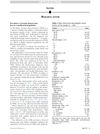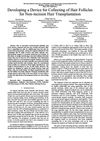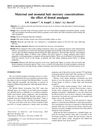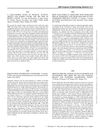 March 2008 in “Aging health”
March 2008 in “Aging health” Docetaxel is safe and works well for older people with cancer, with manageable side effects.
 1 citations,
June 2022 in “Journal of Paediatrics and Child Health”
1 citations,
June 2022 in “Journal of Paediatrics and Child Health” Young adults who had liver disease as children often experience significant health problems and frequently need transplants.
 7 citations,
February 2022 in “Journal of Personalized Medicine”
7 citations,
February 2022 in “Journal of Personalized Medicine” Platelet-Rich Plasma therapy significantly increases hair density in people with Androgenic Alopecia, and works better with more treatments per month and in younger patients.
 8 citations,
March 2018 in “Expert Review of Respiratory Medicine”
8 citations,
March 2018 in “Expert Review of Respiratory Medicine” Inhalation therapy may repair and protect elastin in the lungs of COPD patients.
2 citations,
September 2021 in “Clinical, Cosmetic and Investigational Dermatology” Hospital staff have a higher rate of hair loss than the general population.
 38 citations,
June 2005 in “Contact Dermatitis”
38 citations,
June 2005 in “Contact Dermatitis” Patient had scalp allergy from minoxidil; test helped identify cause and suggest alternative treatments.

Most postmenopausal women experience significant skin changes and various skin conditions.
 3 citations,
July 2016 in “Atlas of the Oral and Maxillofacial Surgery Clinics”
3 citations,
July 2016 in “Atlas of the Oral and Maxillofacial Surgery Clinics” Careful planning and technique in upper facial rejuvenation can minimize risks like hair loss, nerve damage, and scarring.
 August 2024 in “Applied Sciences”
August 2024 in “Applied Sciences” Plant extracts may help prevent or reverse hair graying.
 3 citations,
January 2019 in “International Journal of Trichology”
3 citations,
January 2019 in “International Journal of Trichology” The balance of thiol-disulfide in women with hair loss is affected but not damaged.
 8 citations,
June 2020 in “Dermatologic Therapy”
8 citations,
June 2020 in “Dermatologic Therapy” Hair loss lowers quality of life, causing embarrassment, frustration, and sexual rejection.
 926 citations,
June 2010 in “BMC Medicine”
926 citations,
June 2010 in “BMC Medicine” Polycystic ovary syndrome is a complex condition that affects women's mental, reproductive, and metabolic health throughout their lives.
 58 citations,
December 2020 in “Mayo Clinic Proceedings”
58 citations,
December 2020 in “Mayo Clinic Proceedings” The conclusion is that individual differences in COVID-19 severity are influenced by factors like age, sex, race, and genetics, which are important for personalized medicine.
 January 2020 in “Turk Dermatoloji Dergisi”
January 2020 in “Turk Dermatoloji Dergisi” Men with baldness, ear creases, and hairy ears have a higher risk of heart disease.
 17 citations,
May 2016 in “Journal of Psychosomatic Research”
17 citations,
May 2016 in “Journal of Psychosomatic Research” Illness perception affects mental health and quality of life in Chinese alopecia patients.
2 citations,
January 2019 in “Journal of Cosmetics, Dermatological Sciences and Applications” The supplement and lotion significantly reduced hair loss and improved hair health.
 August 2022 in “IntechOpen eBooks”
August 2022 in “IntechOpen eBooks” The best treatment for Frontal Fibrosing Alopecia and Lichen Planopilaris combines oral and topical medications to reduce symptoms and stop hair loss.
March 2024 in “Journal of functional biomaterials” A kimchi-derived bacterium could help whiten teeth and prevent bad breath.
 January 2023 in “Open Journal of Endocrine and Metabolic Diseases”
January 2023 in “Open Journal of Endocrine and Metabolic Diseases” Hyperandrogenism is a common hormonal disorder in women, often linked to PCOS.
 2 citations,
April 2021 in “Journal of The American Academy of Dermatology”
2 citations,
April 2021 in “Journal of The American Academy of Dermatology” Female pattern hair loss affects 32.3% of women, increasing with age and showing no racial differences.
 June 2023 in “International journal of research in ayurveda and pharmacy”
June 2023 in “International journal of research in ayurveda and pharmacy” Dhatryadi Rasayana, an Ayurvedic herbal mix, may be a safe and effective way to prevent premature hair greying.
 2 citations,
December 2021 in “F1000Research”
2 citations,
December 2021 in “F1000Research” Most people in South India lack knowledge about managing COVID-19 at home.
 8 citations,
March 2020 in “Dermatologic Therapy”
8 citations,
March 2020 in “Dermatologic Therapy” The new hair loss treatment kit was safe and improved hair growth without any adverse effects.

Researchers developed a new device that improves non-incision hair transplant efficiency.
 25 citations,
October 2015 in “Dermatology”
25 citations,
October 2015 in “Dermatology” Dapsone improved pustular psoriasis in patients who didn't respond to other treatments and is considered a well-tolerated option.
 March 2014 in “CRC Press eBooks”
March 2014 in “CRC Press eBooks” Some nutrients and antioxidants may improve skin and hair health, but more research is needed to confirm these benefits.
 March 2003 in “BJOG: An International Journal of Obstetrics and Gynaecology”
March 2003 in “BJOG: An International Journal of Obstetrics and Gynaecology” Mothers and newborns with dental fillings have higher mercury in their hair, but adding fillings during pregnancy doesn't raise mercury levels further.
May 2021 in “F1000Research” The treatment led to denser, thicker hair growth and less hair loss.
1 citations,
January 2019 in “Journal of Biomedical Science and Engineering” CGF from platelets helps hair regrowth in people with androgenetic alopecia.
 June 2006 in “American Journal of Epidemiology”
June 2006 in “American Journal of Epidemiology” Being obese and eating too many calories may increase the risk of kidney cancer, but physical activity doesn't seem to affect this risk.

























